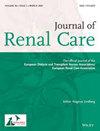Perceptions of haemodialysis nurses regarding patients' and families' loss and grief
Abstract
Background
The experience of loss and grief in patients' lives with life-long treatment in haemodialysis, and in their families' lives is a major cause of mental health problems. In practice, nurses often describe a lack of time and limited knowledge of how to provide nursing care in situations of loss and grief, thus finding out from nurses' perspectives of what competencies they need to provide care would be useful for the development of nursing practice.
Objectives
To develop knowledge in a nursing perspective of competencies to provide care for patients and their families, who experience grief linked to loss due to kidney failure, haemodialysis and/or death.
Design
The study took a phenomenological-hermeneutical approach. Semi-structured interviews were conducted 12 nurses caring for patients receiving haemodialysis with no kidney transplantation option and family members. Ricoeur's interpretation theory involving naïve reading, structural analysis and critical interpretation and discussion was used for analysis.
Results
Four themes emerged of nurse's experiences: (1) patient's loss and grief in everyday life, (2) dealing with supportive conversations when caring for patients, (3) families' losses are resulting in grief reactions and (4) importance of close relationships when caring for families.
Conclusions
To nurses, patients on haemodialysis and their families have multiple loss and grief experiences. Nurses' working in kidney care need to develop competencies to support patients and families to cope with grief and loss. Further research is needed to develop these competencies and then to implement in education and practice.

 求助内容:
求助内容: 应助结果提醒方式:
应助结果提醒方式:


